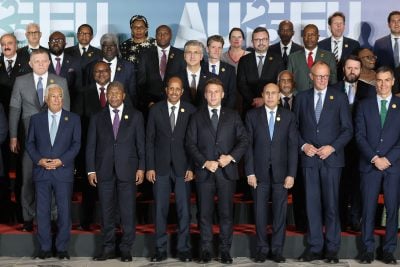Much has been made about the potential of Africa’s ambitious free trade agreement to boost economic growth, with a recent International Monetary Fund (IMF) study suggesting it could increase the flow of goods within the continent by more than 50%.
Given that agriculture alone generates more than a third of Africa’s GDP, food systems will be key to the success of the African Continental Free Trade Area (AfCFTA), providing immediate benefits from a dominant sector across all signatories.
The AfCFTA was agreed in May 2019 and took effect in January 2021. Since then, progress towards full ratification has stalled amid ongoing negotiations over customs, tariffs and competition rules. But with the agri-food sector representing both common ground and a primary industry across the continent, agriculture should be prioritised as a test case for AfCFTA adoption to spur not only economic growth and trade but also food security and better livelihoods premised on greater climate resilience.
As the African Union sets out to accelerate AfCFTA’s implementation this year, it is critical that Africa also embraces a new era of agricultural innovation that is pragmatic, collaborative, and consistent to deliver on the promise of the agreement to create one African market. Innovation that drives policy and productivity could help set a precedent for other sectors while simultaneously tackling the more immediate challenges, including hunger, malnutrition and poverty.
Read more about the AfCFTA
- What you need to know about the AfCFTA
- Africa Day 2023: Accelerating implementation of the AfCFTA
- It’s time for Africa’s partners to get serious about the AfCFTA
Vital to leveraging agricultural research and innovation to drive forward intra-African agri-food trade is closer collaboration between the public and private sectors. The Eighth Africa Agribusiness and Science Week, taking place June 5-8 in Durban, South Africa, provides a timely opportunity to unite agri-food research and industry.
Action plan for agricultural innovation
And leading this charge are our two organisations – the continent’s apex agricultural research and coordination organisation, the Forum for Agricultural Research in Africa (FARA), and CGIAR, the world’s largest publicly funded agri-foods-focused partnership.
Together with the African Development Bank (AfDB) and the African Union Commission (AUC), FARA and CGIAR have committed to a shared action plan for agricultural innovation over the coming years. This plan is based on common principles defined in the Abidjan II agreement that puts the interests of African food security, development and economic growth at its heart.
Firstly, unlocking innovation to increase agri-food production and trade sustainably will rely on demand-driven research and development that responds to African smallholder farmers’ specific needs and challenges.
An estimated 65% of the world’s remaining uncultivated arable land is in sub-Saharan Africa, yet the region produces only 10% of global agricultural output. New technologies, services and good agricultural practices (GAP) must therefore address the unique factors that determine African productivity, including the disproportionate impacts of climate change and the increasingly young population.
African agriculture needs innovation that accounts for the fact that 65% of land is considered degraded, up to half of its harvest is lost to pests and other environmental challenges, and by 2030, almost 120m people will have to contend with drought, floods, and extreme heat.
To shore up the impending productivity shortfalls, agricultural innovation in the years ahead will be led by African priorities and expertise, developed according to global best practices, to reinforce the foundations of a competitive and dynamic sector.
Secondly, both existing and emerging innovations must reach enough farmers to be adopted at scale to make a meaningful difference to the continent’s food systems.
Transforming and sustaining African food, land and water systems is a complex challenge that requires different stakeholders working together, using spaces for them to share their knowledge, expertise and experiences.
This is why our organisations are working together with others to help streamline funding, infrastructure and the last-mile delivery of breakthroughs to transform African agriculture. Equipping farmers with the latest science and innovation will fulfil not only AfCFTA but the broader goals of Agenda 2063, including the core values enshrined in its Comprehensive African Agricultural Development Programme (CAADP).
This collaboration is already under way, with the second phase of the AfDB’s flagship Technologies for African Agricultural Transformation (TAAT) initiative recently receiving an additional $27m in funding. TAAT, led and implemented by CGIAR with partners, aims to double productivity across African agriculture by making proven technologies available to more than 40m producers by 2025.
Collobaration is key
Finally, closer alignment between like-minded organisations makes us greater than the sum of our parts and offers governments and donors consolidated returns on investment.
CGIAR’s global network of a dozen world-class research centres and myriad partners can complement, equip, and strengthen African institutions, offering learnings from elsewhere in the Global South to maximise the likelihood and pace of success. In turn, African institutions continue to drive the operationalisation of the CAADP Malabo commitments, ensuring African challenges and opportunities are met with African solutions that are effective and sustainable.
With a renewed agenda for innovation and a united front across the key players at global and continental levels, agricultural development can underpin the fulfilment of AfCFTA. In doing so, together, we can deliver improved livelihoods, incomes and economic growth as well as food security, nutrition, and greater equality – an ambition we can all get behind.
Want to continue reading? Subscribe today.
You've read all your free articles for this month! Subscribe now to enjoy full access to our content.
Digital Monthly
£8.00 / month
Receive full unlimited access to our articles, opinions, podcasts and more.
Digital Yearly
£70.00 / year
Our best value offer - save £26 and gain access to all of our digital content for an entire year!


 Sign in with Google
Sign in with Google 



